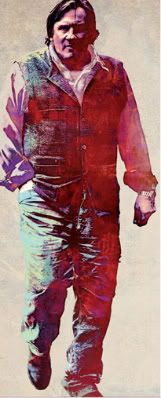 A haunting detective introspective, “Inspector Bellamy” is a French Hitchcockian tour de force. It probes the human psyche as it investigates both the crime and the detective.
A haunting detective introspective, “Inspector Bellamy” is a French Hitchcockian tour de force. It probes the human psyche as it investigates both the crime and the detective.
Was it coincidental that “Inspector Bellamy” was the last film of famed French director and screenplay writer, Claude Chabrol? Was it also just coincidental that award-winning actor, Gérard Depardieu, who had never worked with Chabrol before, came out of an officially-announced 2005 retirement to star in this film?
Is there something especially revealing about both Chabrol and Depardieu in their choice of this particular story? Is something important exposed other than the clues to a crime?
In its run this month at the historic Hollywood Theater, the viewer will receive a rare cinematic treat. Inspector Bellamy, played by an obese Depardieu (62), has a beautiful, loving, beatific wife, played by the lovely Marie Bunel (46). Their tender, loving interactions juxtapose Bellamy’s confession of a tortured secret from his youth.
The film is book-ended with similar scenes of destruction connecting at least three interwoven stories, one of which is Bellamy’s, in this surprising detective tale.
Ostensibly the film involves Bellamy, a vacationing celebrity police detective, and the irresistible lure of a puzzling case. He is sought out by a killer who has been trying to pretend he’s dead. It turns out that the murderer kindly wants death benefits to go to his wife so he can vamp off to America, guilt-free, with a beautiful young seductress (Vahina Giocante). In order to trump up his death, he has used a disheveled homeless bum to double for him in an exploding car wreck. Of course, the insurance company notes the lack of dental correlation so the passion-blinded perpetrator is wondering what to do next.
Chabrol, the film’s director and co-writer, died at age 80 a little more than a month before “Bellamy” was released. He most admired and emulated Alfred Hitchcock and became best-known and loved in France for making psychological thrillers that exhibited an insightful reflection of human nature. His work was famous for depicting more pity for the perpetrator than the victim of a crime.
In “Bellamy,” the detective’s saintly wife comments about Bellamy’s rapscallion, just-out-of-jail half-brother, “He’s weak. You have to forgive him.” Bellamy responds gruffly, “Why do we always have to forgive the weak?” She gently answers, “Because they’re weak. That’s how it is.”
The viewer sees the criminals in the story not as primarily bad, scary or even evil, but as vulnerable and powerless. In this sense, they can even be viewed as the victims – victims of their own selves and the conditions in which they find themselves trapped.
What distinguishes the criminal from the inspector and the regular person – us?
And what was on Chabrol’s mind as he asked Depardieu to come out of retirement for this film? Knowing that at 80 his time was limited, and knowing that he suffered from acute anemia, why would he choose to write and direct this particular kind of detective story?
Is it related to the secret Bellamy confesses to his wife?
While hidden sins may help temper our own arrogance, perhaps, in a Dostoevsky-ish way, they also ravage our conscience. As Bellamy says, after he tells his wife his deepest shame, “I’ve found a kind of dignity in despising myself.”
The film asks questions, searches the inner soul of the inspector (how aptly named), and juxtaposes his character with the conscience of the killer and the life of his self-destructive half-brother. This insightful screenplay is a masterpiece of talented acting and directing.
FILM CREDITS
Director: Claude Chabrol
Writers: Odile Barski, Claude Chabrol
Cast: Gérard Depardieu, Marie Bunel, Vahina Giocante, Clovis Cornillac and Jacques Gamblin
U.S. Release: Oct. 29, 2010
Now Playing: Hollywood Theater
Runtime: 1 hour, 50 minutes
. . .
Follow Bev Questad on Twitter at http://twitter.com/questad.